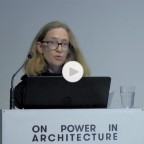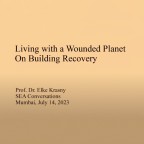Scales of Care: Affective Ecologies and Reproductive Urbanism, Montevideo Architecture Public School Online Seminar, April 6, 2022
Scales of Care: Affective Ecologies and Reproductive Urbanism
Starting from the observation of care fatigue and environmental exhaustion, take back care focuses on socio-ecological justice. Exhaustion and fatigue come to bear most on those who are always already considered key caregivers and essential workers. Be it the labor of guardians of the land, who restore conditions for animals and plants, be it the labor of kinship practices for family as well as community needs, such necessary care is taken for granted.
Those who provide such life-making care outside fee-paid or salaried regimes, are suffering from care exhaustion and care fatigue. Looked at through a historico-environmental lens, the environment has not fared much better and been understood to relentlessly provide what humans need for free. Environmental fatigue and ecological exhaustion result from this exploitative approach to the environment. The woman-nature nexus that has been at the core of racial capitalism and the patriarchal ideology of modernity, will be re-examined to stress the interdependence of humans and nature in care. Nature and bodies thus appear as interlinked sites of feminist struggles and everyday anti-capitalist, degrowth practices for eco-social justice. Capitalism’s answer to care needs, be they social or environmental, is always through the market. Care is being turned into a service, social services or eco-services. This leads to the relentless exploitation of resources and reproduction, as analyzed by Marxist feminism and transnational decolonial feminism. Foregrounding the economic relevance of care to anti-capitalist strategies as well as the political dimension of everyday feminisms, the workshop builds on Audre Lorde’s observation that “caring for myself is not self-indulgence, it is self-preservation´, and that is an act of political warfare.” Everyday care feminism focuses on the reproductive crisis that leads to human and environmental injustice and seeks to work for degrowth on an everyday level. The workshops use the iceberg framework developed by Gibson-Graham in their book Take Back the Economy to work out how anti-capitalist strategies connect caring labor, self-
care practices, spacial and environmental concerns.



